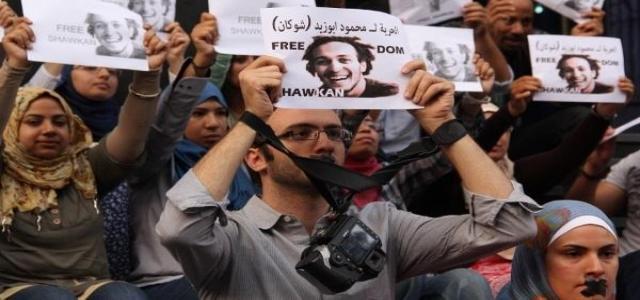- Activites
- January 31, 2010
- 5 minutes read
Cairo International Book Fair in full swing as literary censorship remembered

The books are in place on the shelves and thousands of Egyptians and foreigners scour the titles, searching for a deal that will make it worth buying one of the millions of books at the 2010 Cairo International Book Festival, which kicked off last Thursday. Russia is the invited guest, but for many, it is the usual publishers who will make the greatest impact.
“I have been coming to the book fair for years and always go to a few places because they have the best deals,” said Omar Yussif, a 29-year-old aspiring writer. “They have great deals and many of the books that I can’t find in regular shops.”
The festival lasts until February 13, and is home to hundreds of stalls, where texts in dozens of languages can be purchased. For the foreigners, the American University in Cairo (AUC) offers the best chance for great deals. This year, as the university makes the complete move to its new campus outside Cairo, the AUC Press is offering books at half price, which has many whetting their appetites over possible purchases.
“We have all these books at half off because we are moving from our location downtown to a new one and have to get rid of them,” said one employee managing the area. Already, dozens of people have stacks of books in hand, waiting to get home and start the reading.
“I can’t wait, it is so much fun and with AUC going half off, amazing!” said Mark, an American study abroad student. “A lot of these books here at the festival, I haven’t been able to find.”
But, not all is fun and games. For some, it is yet another example of the Egyptian government’s crackdown on publishing and free speech. One published author, who asked not to be named, said that while the festival will likely be a success, “we need to look at what else has been going on in terms of censorship in this country.”
He argued that for many young writers “it has to be disappointing because they know they have to stay within the lines of what the government wants and doesn’t want or else face the chance of not getting their work seen. It is deplorable.”
Case in point was when a Cairo misdemeanors court fined author Magdy el-Shafei and publisher Mohamed Sharkawi 5000 Egyptian pounds ($900) last November and demanded the confiscation of the graphic novel “Metro” after accusing them of writing and distributing a novel, which included statements and phrases considered “offensive to public morals.”
The verdict is already been widely viewed as a further blow to freedom of speech and creativity in Egypt.
The controversy started in April 2008, when police broke into the publishing house and confiscated all copies of the book. They then went to all bookstores and took the novel from the shelves, without warrant, the Arabic Network for Human Rights Information (ANHRI) made clear in repeated press statements.
The police conducting the raid hailed from the Vice Squad, or discipline police – increasing in use recently to rid society of unnecessary material – which has surprised many observers.
The discipline police do not usually deal in such affairs as censorship, Mohamed Youssri, former head of Tadamon (Solidarity) NGO – an umbrella organization that works to bring together like-minded NGOs in the country – said last year.
The discipline police are a sector of the ministry of interior who deal “with prostitution mainly and a few other things,” so it was shocking to Youssri that they were responsible for the seizure of the text.
The novel deals with politically sensitive issues and what may have sparked government interest is the limited sexual content of the book. For many, it comes as no surprise that the government is using this as a scapegoat to keep the politics from reaching a wider audience.
Three human rights organizations condemned the November court ruling, including ANHRI and the Hisham Mubarak Law Center in a joint statement. The rights groups called on all those concerned with freedom of expression and creativity to show “solidarity with the author and publisher of the novel, especially as the novel was the first Egyptian graphic novel and received many awards and certificates of appreciation from specialist critics.” They argued that the criticism of literary works should not be in the courtroom.
Despite this curtailing of free speech, the festival continues and is likely to see thousands, if not millions, grace the fair in search of that special read.
***



